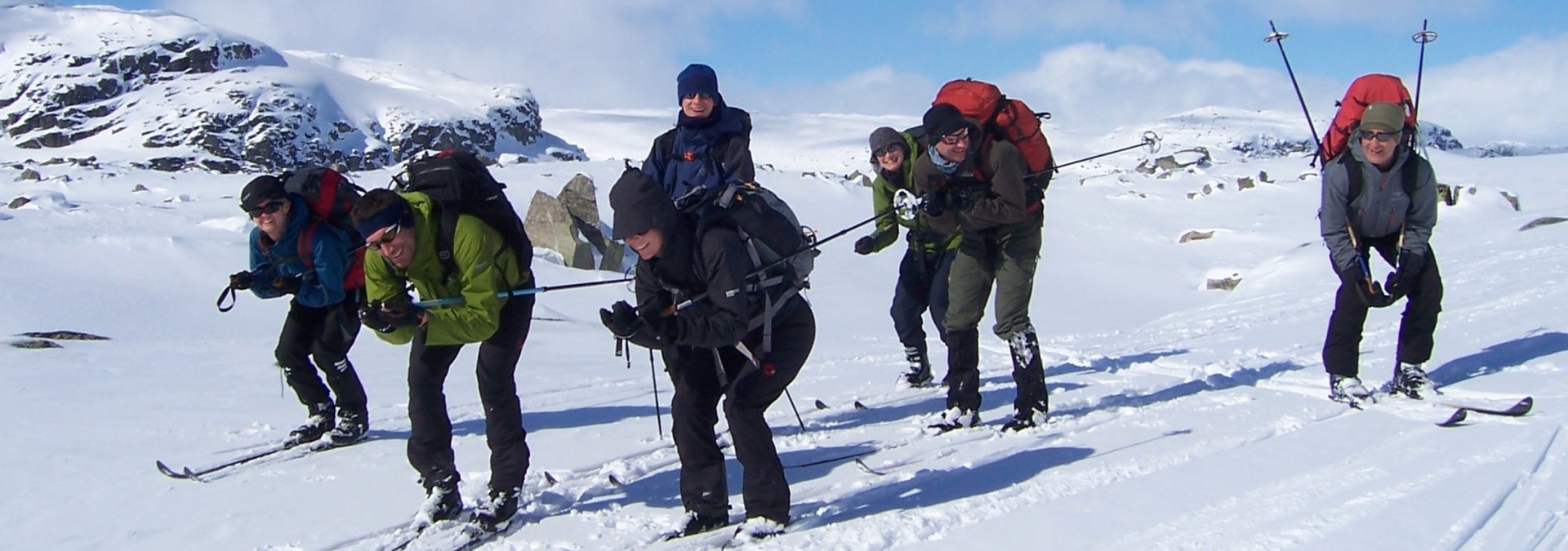
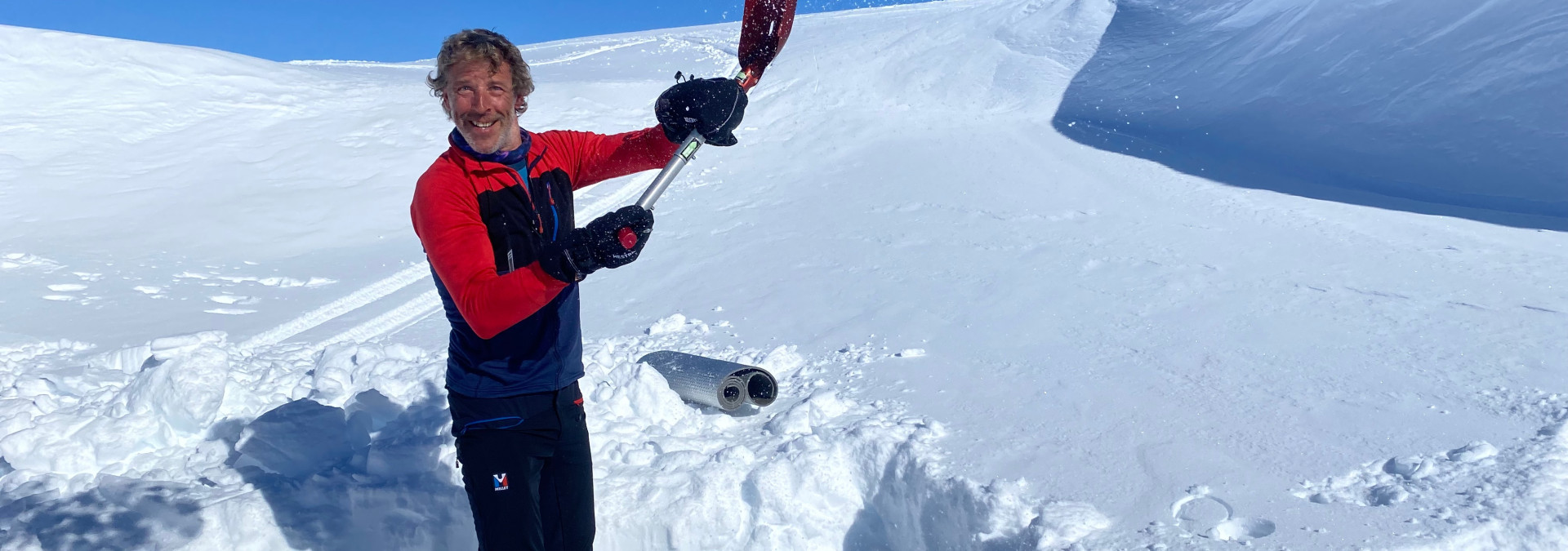
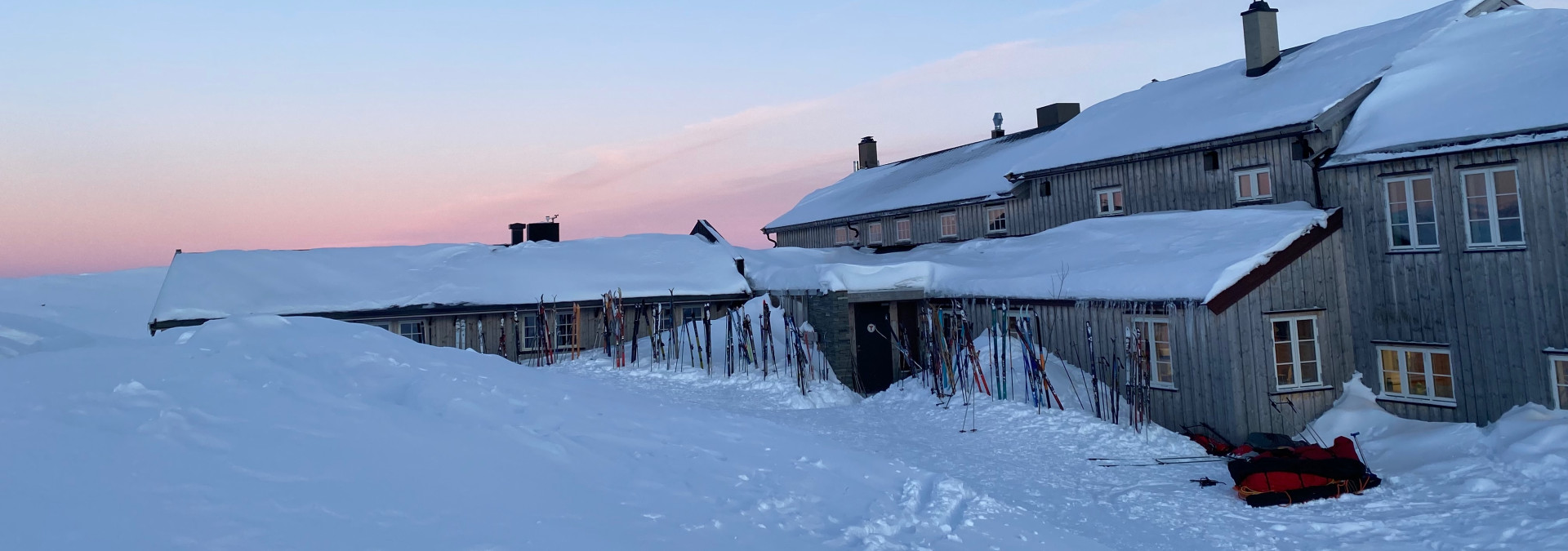
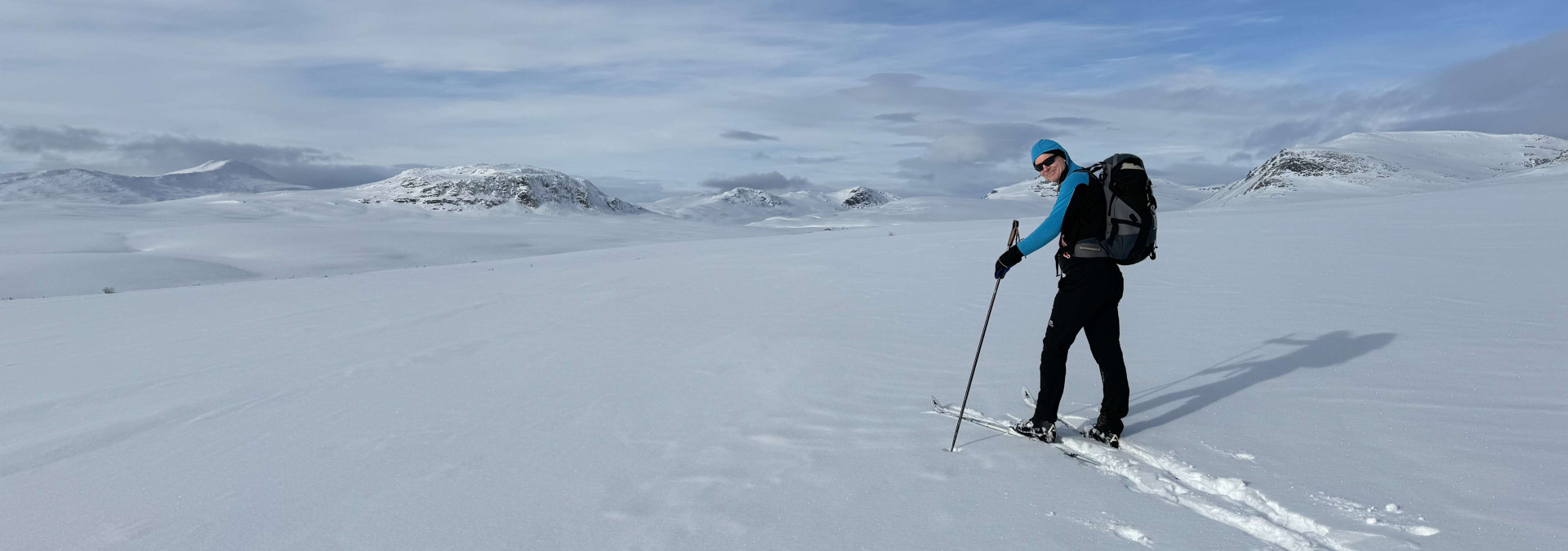
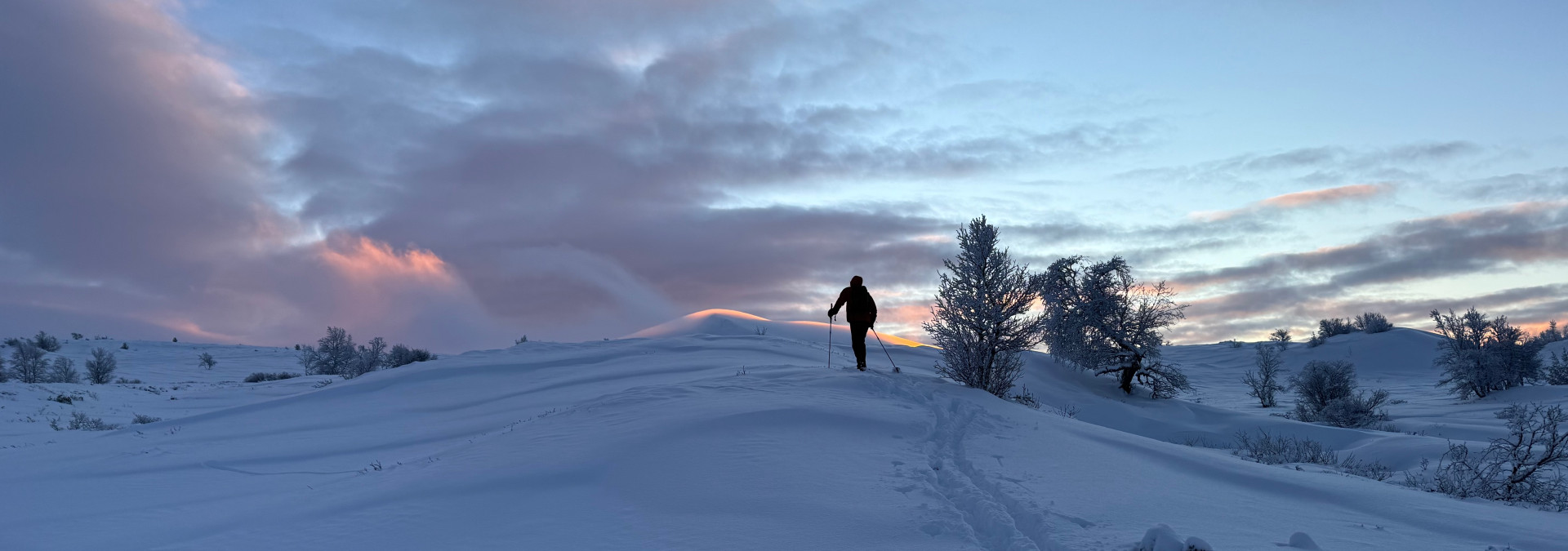
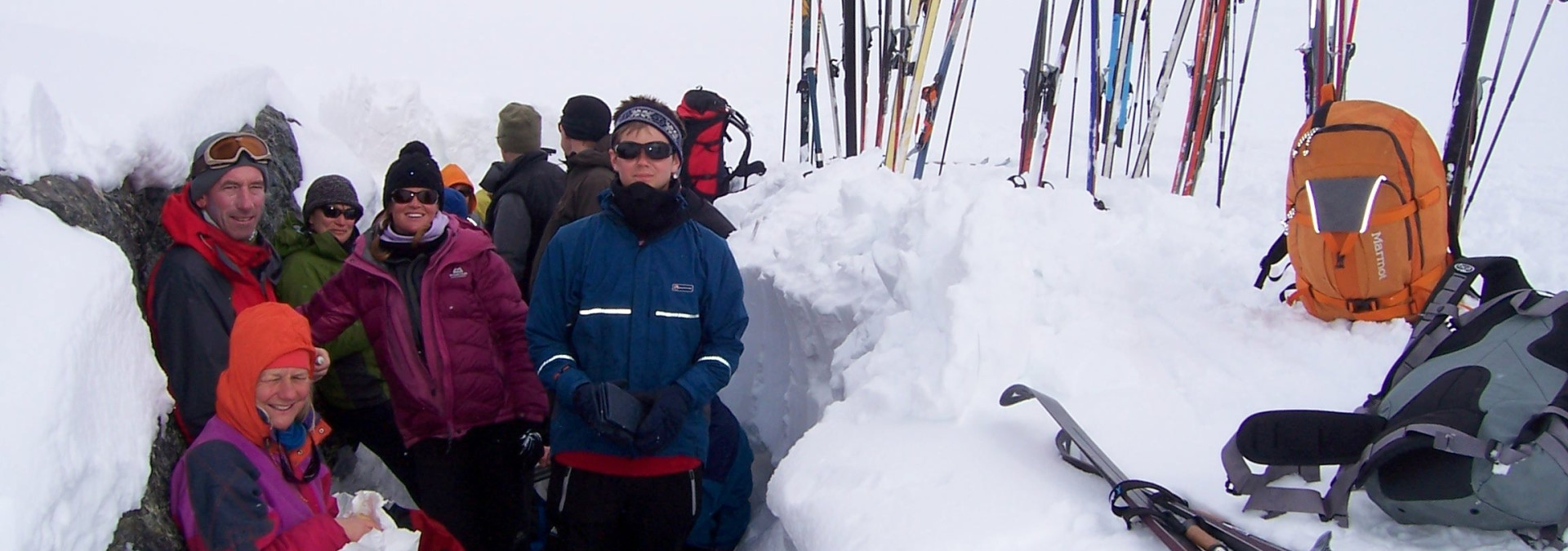
NEW: Discover the perfect introduction to off-track Nordic ski touring in Norway’s stunning winter landscapes. Our journey begins in Geilo, the gateway to the renowned Hardangervidda National Park. We start the week focusing on technique, using prepared ski tracks for a relaxed and enjoyable introduction to the sport.
As the week progresses, we venture deeper onto the Hardangervidda, staying in a cozy mountain lodge where you’ll receive instruction in a range of off-track skills. Along the way, we cover essential winter safety techniques, ensuring you gain both confidence and competence in this spectacular alpine environment. This trip blends learning, adventure, and the wild beauty of Norway’s high plateau for an unforgettable winter experience.
Nordic 'off-track' skiing is cross country skiing away from marked and pressed trails. There will be an emphasis on travelling, turning and controlling speed in a variety of snow types. A great opportunity to learn everything you need to know to enjoy the mountains in winter.
We begin in Geilo where there are 130 kms (80 miles) of prepared tracks, ideal for the teaching phase of this trip. Skiing off-track uses many of the techniques of 'classic' style track touring, but with a few added extras. The skis are wider than those used for track skiing holidays, and the boots chunkier, sturdier and warmer.
This is an ideal opportunity to develop your Nordic ski touring skills with a view to more ambitious hut-to-hut tours elsewhere in Norway. Enjoy our article on Crossing the Hardangavidda: hut-to-hut ski touring in Norway.
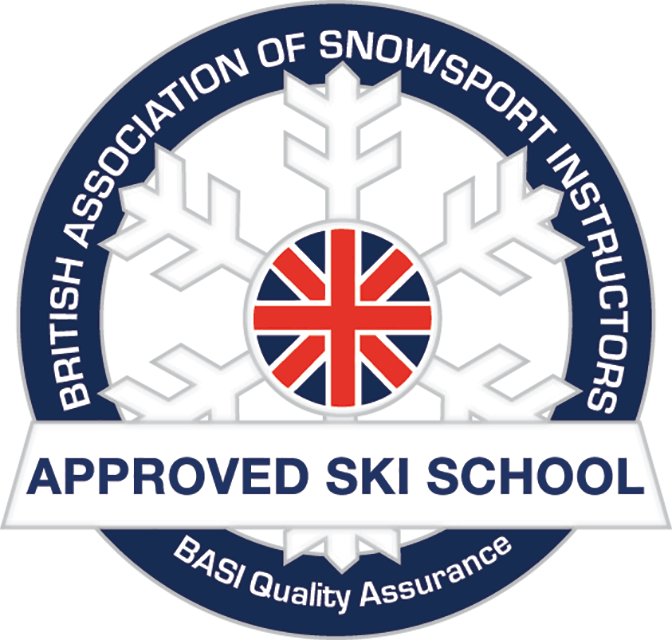
Jason has a high level of mountain skills, is a good ski coach, and demonstrated sound judgement related to safety and skill level of the team.
Today you arrive in Geilo, the gateway to two national parks the Hallingskarvet National Park and the Hardangervidda National Park, Norway's largest national park. The town itself is small and picturesque with many buildings of typical Norwegian style. Alpine ski slopes and groomed Nordic tracks rise either side of the town which lead onto the plateaux and mountains beyond. There is a compact shopping centre with a range of shops, supermarkets, a bank, ATMs, post office etc. Tonight your Ski Instructor will provide a briefing and then join you for dinner.
Throughout this week our goal is to introduce you to the joys of off-track touring on Nordic skis. Acquiring the ski skills to enable you to forge fresh tracks away from the groomed trails opens up a whole new world of winter exploration. The aim is for a relaxed adventure on Nordic skis where the emphasis is not on distance skied, but on knowledge and skills acquired, while having a whole lot of fun in this stunning area of Norway. This morning, after collecting our hire skis, we will head on to the tracks around the lake which lies below the town of Geilo. The goal will be to reacquaint you with Nordic skis while on prepared trails, allowing time for instruction and chat about travelling techniques. At all times your instructor will create a supportive environment which encourages personal ski development. Overnight Geilo.
Today we venture northwards into the mountains and towards the Hallingskarvet National Park. The Park, which was established in 2006, is one of Norway's newest national parks. Hallingskarvet is an imposing high plateau surrounded by spectacular cliffs. The area is well known as a place where people in ancient times used to hunt the reindeer herds on which they relied for their survival. Remains dating back 8000 years have been found here. The Park is also one of the few places in Southern Norway where the arctic fox still exists, while the grazing areas in summer are perfect for reindeer which roam here throughout the year. We can enjoy skiing across this wild open landscape, while using both groomed trails and off-track routes. The mountain hut at Prestholtseter is open in the winter months and a cosy cup of coffee and cake will help fuel our return ski back to Geilo. Today we will be doing more distance on our skis aiming for approximately 15km (9.3 miles) which we would consider a relatively relaxed Nordic touring day. Overnight Geilo.
This morning we will head across the valley and up the mountain to the small mountain settlement of Kikut where we will access the easier downhill ski slopes. By using the ski tows and lifts to access some gentle slopes it means we can work on controlling speed and direction.The goal is to learn to embrace the descents, and be confident in your ability to slow down when required. We will also look at how to traverse slopes using some ski techniques which will allow you to descend in control and in confidence, and hopefully with a smile on your face! We may have time to pop into Hakkesetstølen Fjellstugu for waffles and hot chocolate to visit Torild who has farmed there for many years. She is proud to mention that Queen Sonja of Norway travelled toHakkesetstølen to officially opened the new log cabin in 1993. At the end of our ski day we will ski back down the mountain all the way to Geilo. Overnight Geilo.
The Hardangervidda is famous throughout the world for its vast snow covered plateau. For generations Norwegians have ventured into the Hardangervidda National Park to enjoy the winter months touring from lodge to lodge on Nordic skis. This is your chance to join the off-track ski world as we leave Geilo and make our way to our lovely mountain lodge at Krækkja which is run by the DNT. The DNT is Norway's famous trekking organisation which manages and operates over 500 mountain cabins across Norway. They are always characterful and cosy, with great food and hospitality and frequented by like-minded people who love the mountains. Many new friends are made over hot chocolate and waffles in the DNT cabins. Krækkja was the first DNT lodge on the Hardangervidda, but people have lived at Krækkja for several thousand years with the remains of ancient settlements lying almost at the lodge door. Our route is gentle as we have only about 4km's (2.5 miles) to ski from our drop-off at the roadside to the cabin. In the afternoon we will explore the surrounding area before retiring to our lodge for a hearty dinner. Overnight Krækkja DNT lodge.
Krækkja is ideally placed for encouraging confidence on Nordic skis with a wide open lake in front of the lodge, and gentle slopes around the area. Today we can choose to explore in almost any direction, either along the way marked trail to the remote settlement of Finse, or perhaps towards the mountain lodge at Halne which is only about 5km from our accommodation. Whatever our choice of route it will be a day of learning when we will be looking at the snowpack in terms of avalanche risk, chatting about digging a snow hole in an emergency, and generally ensuring you have expanded your knowledge of how to ski and be safe in the Norwegian mountains in winter. We expect that today we will ski approximately 15km (9.3 miles) in terms of distance, but time will also be spent on ski technique as well as general mountain knowledge.
After a week of off-track fun, this is your day to bring all your new found knowledge together as we head back to civilisation and Geilo. A leisurely buffet breakfast will be followed by our preparations for leaving our DNT lodge. There are various options for skiing 'out' from Krækkja and our route for the day will depend on snow conditions and weather. Often in the mornings there are kite skiers on the lake in front of Krækkja and we may ski alongside the lake where you can pit your speed against those with wings! Today is the day you have your final chance to tap into your Ski Instructors knowledge of off-track touring. Hopefully we will have helped you begin a whole new career of exploration on skis. Overnight Geilo.
Today is your departure day from Geilo.
It is always our aim to complete the proposed itinerary outlined above, however, it may be necessary for our guides/instructors to adjust the daily itinerary based on the weather conditions, group safety and enjoyment.
On all of our trips we aim to accommodate our guests in well-situated, comfortable, characterful, family run accommodation.
We take time to research, update and view the best options available to us. On this trip we will be staying in an hotel in Geilo for the first four nights of your trip and again on the last night. We will also be staying in a cosy Norwegian mountain lodge for two nights. The mountain lodge we will use is owned and operated by Den Norske Turistforening, which is the Norwegian Trekking Association. The DNT lodges are famous world-wide and are quite an experience. Characterful, cosy and welcoming.
All of the DNT accommodation has shared rooms with either 2-3, or 4-6 beds. Whenever possible we try to secure bedrooms for 2 people. All meals, which are excellent in quantity and quality are provided and you make up your packed lunch from the breakfast buffet. There are hot showers, newly renovated indoor dry toilets, drying rooms, a small shop and bar.
Please contact us if you wish to discuss the rooming on this trip.
This historic hotel opened its doors in 1909, at the same time as the Bergensbanen railway was opened linking Oslo with Bergen. Doctor Ingebrikt Christian Holm was a specialist in respiratory diseases and in 1909 he put his knowledge into action and established the Dr Holms Hotel. In the beginning it was a retreat for pale inhabitants of Bergen and Oslo who embraced the fresh mountain air, but today is a cosy and comfortable hotel catering to skiers.
In 2009 the hotel celebrated its 100th anniversary claiming to be ”The Hotel of Nine Lives”. Having survived changing epochs, and enduring gusts of wind of hurricane strength. There is hardly another mountain resort hotel that has endured the years through Norwegian history such as the Dr Holms Hotel.
Krækkja DNT mountain lodge lies on the shores of Lake Storkrækkja, with a view toward the cliffs of Hallingskarvet. Krækkja was the first DNT lodge on the Hardanger Plateau, but people have lived here for several thousand years. The remains of ancient settlements lie almost at the lodge door. The hut which has been run by Martin since 2018, has 85 bunks in two-bunk, three-bunk and four-bunk rooms, a larger room and a dormitory. It has a washroom, dry toilets, and showers inside the hut, no need to go outside. It provides good food and serves a hearty breakfast and dinner. We will make our own packed lunches from the breakfast buffet. It is cosy mountain accommodation that is typical of the Norwegian mountains. The lodge offers a great introduction to staying on the Hardangervidda.
There is no wifi, so a great chance to talk! There are some electrical charging points, but note that power comes from a generator and therefore any charging can take a long time. The hut is fully licenced.
Arrival
Travelling to Norway by Train: There are options for rail travel to Norway from all major European cities. For example from the UK you can overnight in Copenhagen, Denmark, however, there are many possibilities. The easiest way to book is via Rail Europe or The Train Line. If you're travelling from the UK or USA then take a look at the multi-day pass travel system provided by Eurail. If you would like to book each stage as an individual journey you can view the example given below which shows how to get from the UK to Copenhagen, in Denmark.
Travel from London, England, to Brussels, Belgium using the Eurostar. These tickets can be purchased up to 6 months ahead of your travel date. Then book a train from Brussels, in Belgium to Gothenburg, in Sweden, (Gotëborg) adding a stopover in Copenhagen, Denmark. For this you can use the German Railway website. A full day on the train sees you arriving in Copenhagen in the evening.
The final leg of your journey is from Gothenburg Central Station, in Sweden, to Oslo, Norway, and this can be booked using Vy the Norwegian rail network. All the trains have Wi-Fi, charging points and a restaurant car.
Travelling to Norway by air: If travelling via Oslo we recommend flying to Gardermoen airport, the main airport in Norway. It's possible to fly to Oslo Torp or Oslo Rygge, but you will need to allow time to travel to Olso city centre to take the train north. Transfer links to Oslo can be found on the Torp airport website. There are three trains each day from Oslo to Geilo. If possible aim to arrive in time for your briefing before dinner. Train tickets should be purchased as soon as possible as they can be 'sold out'. Some services may not be available for purchase until 60 days before departure. Your flight arrival times into Oslo Gardermoen should be approximately 1.5-2 hours before the departure time of the train to allow for flight delays.
Travelling to Geilo: There are three trains each day from Oslo to Geilo. If possible aim to arrive in time for your briefing before dinner at 1800hrs. Train tickets should be purchased in advance as they can be 'sold out'. Some services may not be available for purchase until 60 days before departure. The train timetable can be found HERE.
On your departure day we will be in Geilo and within easy access of the train station for onward travel.
If you would like to spend extra nights in Oslo, the capital city of Norway, we can suggest several city centre hotels. Single rooms are available in each of the following options:
The City Box Hotel, Oslo which is where our guides stay between trips. The hotel is very reasonably priced, convenient for the railway and bus stations. The hotel also offer washing facilities if you are running trips back to back and need to launder clothes.
The Thon Hotel Opera is a very short distance from the central railway station and, indeed, the Opera House. It is approximately 100 metres (328ft) from the railway station. Karl Johan high street, the main shopping thoroughfare, is a two minute walk from the hotel.
The Thon Hotel Spectrum is also central and approximately 600 metres (1968ft) walk from the central railway station.
These last two hotels are part of the Thon hotel chain. We would normally recommend family run hotels, but they are not easily found in central Oslo and we feel that the Thon group do provide good accommodation which is easily reached from the railway station. You will be able to book either of these online.
If you would like inexpensive accommodation in Oslo we can recommend the Perminalen Hotell. The hotel has a choice of accommodation ranging from bedrooms to same gender dormitories. It is approximately 850 metres (2788ft) from the central railway station.
Activity, Injury and Mountain Rescue
It is a condition of booking that you are insured against medical expenses, injury, illness, death, cost of repatriation and personal accident risks. For all of our trips your insurance must also cover mountain rescue. The exception to this is if the trip is being held in the United Kingdom or Norway where mountain rescue is free of charge. Please ensure that your insurance covers you to the maximum altitude given on your trip itinerary. The maximum altitude for any trip can be checked on the 'At A Glance' box on each trip page.
Trip Cancellation/Curtailment Insurance
You should also have insurance to cover trip cancellation and curtailment. Insurance should be booked as soon as we have confirmed that your trip is going ahead. Note that your deposit and balance payments are non-refundable unless it is Tracks and Trails who cancel the trip due to a failure to reach the required minimum numbers. In this case we will offer you a refund or the option of transferring to another trip if one is available. We also advise that you should have insurance which covers baggage loss/equipment damage as Tracks and Trails will not be held responsible for loss/damage to baggage/equipment.
It is entirely your own responsibility to ensure that any insurance taken out is appropriate for your trip and for the activity you will be undertaking. Tracks and Trails cannot advise on insurance policies and cannot be held responsible if in the event of a claim your insurance is inadequate.
All of the above insurances are detailed in our Terms and Conditions. For further details, please read the Insurance section on our website.
Winter temperatures in Scandinavia are 'according to the locals' warmer in recent years than previously which is why we now run trips throughout the winter months from January till April. Geilo and the Hardanger areas have a reputation for snow, and Norwegians will travel to ski on the Hardangervidda up until May.
Historically temperatures in December have averaged -8°Celsius (17.4°F), in January -9.7°Celsius (14.5°F), in February -9.2°Celsius (15.4°F), in March -6.6°Celsius (20.1°F), and in April -2.3°Celsius (27.9°).
We have found over the years that these temperatures have not been unpleasant nor have any guests had problems dealing with the weather as it is generally a 'dry' cold, and of course this helps create great snow and therefore great ski tracks.
We can organise your ski rental on your behalf from a ski hire shop in Geilo. In 2026 the hire cost for skis, boots, poles and kick skins will be approximately 1500 NOK for the 6 days. A helmet is required when we use the downhill alpine ski slopes and this costs approximately 50 NOK for the day. The hire skis are similar to the Fischer Transnordic 66.
The skis suggested for this trip are metal-edged Nordic backcountry skis similar to the Fischer Transnordic 82 Easy Skin Xtralite with NNN BC bindings or equivalent, with a sidecut of around 82-60-70 mm. It is also acceptable to use skis similar to Fischer Transnordic 66 Easy Skin Xtralite with a sidecut of 66-54-61mm. The term 'sidecut' refers to the width at the tip, waist, and tail. The wider the sidecut the more stability, but less glide. The narrower the ski, more glide, but less stability.
Boots should be leather or soft plastic, with Vibram soles. Poles should be touring length and fit snugly under the armpit when the basket is on the snow surface - a ski pole which can be adjusted is preferred. You also require full-length climbing skins. If you have a 'waxing' ski which allows a short 'kick' skin to be attached you should also bring these for days when the waxing is challenging.
A more expensive, but excellent ski is the award-winning Åsnes Falketind 62 Xplore ski with Rottefella Xplore bindings and Alfa Free Xplore boots. This is a great setup for enjoyment, versatility and stability.
Buying Nordic ski equipment from the UK; we suggest Braemar Mountain Sports or Telemark Pyrenees.
Buying Nordic ski equipment from the USA; we suggest REI Co-Op or Evo.
If you have your own equipment and would like to discuss it's suitability for the trip then please contact us.
Your safety while skiing is our top priority. All skiers are requested to adhere to the Code of Conduct published by the International Ski Federation, or FIS. The aim is to make you, the skier, aware of how to avoid risks, take responsibility and act thoughtfully while on the cross-country ski tracks.
When packing for a trip in the mountains it is important to have appropriate equipment and clothing. This kit list features items we believe are necessary for the weather you will encounter and accommodation you will be using. If in doubt about the suitability of your own skis please contact us.
Group Equipment - we share the carrying of waxes, snow shovels, emergency lightweight shelters, spare ski pole, first aid kit, and any repair kit amongst the group members.
Equipment
Skis, boots, poles, and climbing skins - can be hired at the start of the trip. The skis will be either 'crown' skis or waxing. Helmets will need to be hired for the one day on the downhill slopes. The hire skis are similar to the Fischer Transnordic 66. For further information refer to the section 'Skis and Ski Pass' under Trip Information.
Clothing
Comfort
Personal First Aid
Documentation
Additional Items
**Supplementary snacks if you follow a gluten free or coeliac diet**
Leaders are all first aid trained and carry their own first aid kit
On many of our trips there will be an element of 'group kit' which will be shared amongst our guests. As mountain people you will be used to team work and working together to the mutual benefit and safety of the group. The 'group kit' will be minimal and usually just a case of sharing a few lightweight 'survival shelters'. For example on a week-long trip you may carry a small shelter for just one day before passing it on to the next person. If you are booking a trip in winter there will be a few additional safety items. These will be distributed in such a way that no one is over burdened. Other group items necessary for safety and comfort will be carried by your guide/instructor.
This trip is an ideal opportunity to develop Nordic off-track skills with a view to more ambitious hut-to-hut tours, elsewhere in Norway.
Previous Experience: You should have completed at least one week of 'classic' skiing on prepared tracks at an Intermediate level with instruction.
Skills Set: On groomed tracks you should be confident about controlling speed and direction, have a solid ‘snowplough’ and be able to competently make snowplough turns. You should be able to ski under control on a variety of terrain both uphill, and downhill. The most important skill is the ability to stay upright while skiing with a rucksack. If your trip includes a trip to a hut you will be expected to carry a medium sized daypack, but no more than 10 kgs (22 lbs). Repeated falling leads quickly to exhaustion and jeopordises the group safety. Descending slopes most commonly involves traversing then a stem, or kick turn, followed by another traverse and so on. A telemark turn is not necessary although you may have an understanding of the telemark turn.
Terrain: You should enjoy being in remote and wild mountain areas, have a good fitness level and above all sense of adventure! You should be comfortable with winter weather, which may include snowfall and cold winds. For this reason we expect a degree of self-sufficiency in terms of keeping yourself warm, and dry. You should be happy to ski on a variety of snow including snow that is less than perfect which may be firm, crusty or icy. This trip may include some steep sections with bends, as well as narrow tracks.
Fitness: Time on skis will be 5-6 hours per day covering approximately 10-20 km (6.2-10.4 miles) per day.
Read more about our ski grades.
When booking a holiday as a solo traveller a twin bedded room comprising of two single beds, is booked as standard. This will be with someone of the same gender unless you request to pay extra for your own room. Single rooms are often limited in supply so if you would like to pay a supplement for a single room we urge you to get in touch as soon as possible. When staying at the DNT lodge at Kraekkja there are generally no single rooms available, and we book rooms for two people to share. We cannot rule out being in a larger room for between 3 - 6 people, it is the mountains and we are grateful for a warm bed, hot showers and good food. A single room may be available on the first four nights and on the last night of this trip whilst staying in Geilo. The supplement, if a single is available for all five nights in Geilo, will be £375 in 2026 and £390 in 2027.
We go to great lengths to work with first class guides and instructors who are passionate about their work. They are all fully qualified, insured, and hold the correct documentation.
Please note your guide/instructor has complete discretion to make a daily decision on whether or not to take the advertised route based on the weather and the ability of the members of the group. They have our authority to make any route changes they believe are necessary in the interests of safety and enjoyment.
Your ski guide will be a professionally qualified BASI Nordic Instructor at the least and may also be a BASI Telemark Instructor. They will hold the Winter Mountain Leader Award, or the International Mountain Leader Award or have the ability and relevant experience to navigate in winter conditions. We are always mindful of safety in cold conditions and wilderness areas.
When we leave our hotel in Geilo and travel to the mountains you will leave your main luggage at the hotel. We strongly advise a padlock on your luggage. This is the point where we introduce you to packing your rucksack for Nordic touring! You will take a few extra overnight items in your rucksack for the days we are in the mountains at our DNT lodge.
On your itinerary you will find an indication of the amount of ascent and descent you can expect each day. This offers a guideline to how much effort might be expended each day and allows you to decide, based on previous experience, if your fitness and stamina are correct for the trip.
We make every attempt to ensure these statistics are as accurate as possible, but ask you to note that the most modern of technology used to record these details can show considerable variations in terms of ascent, descent, and in particular distance. In other words no two people using GPS devices on the same route will have exactly the same details recorded at the end of the day.
The statistics given should be used as a 'general' indication of the effort required.
Your ski guide will have the maps required for this trip, but if you would like to arrive with your own maps we have listed those which cover the route:
Statens Kartverk Lankartdivisjonen 1:50,000 Turkart 'Geilo' and Turkart 'Finse'. New style Nordeca maps are also available; sheet 10039 'Hardangerjokulen' and sheet 10040 'Geilo'.
All maps are available online via the Map Shop www.themapshop.co.uk or from Stanfords in London www.stanford.co.uk
It is useful to arrive at your destination with some cash in the local currency, however, on most occasions it is relatively easy to visit a 'cash machine' after arrival and withdraw money on a credit or debit card. Some of our locations are an exception to this where the accommodation will often have no facilities for withdrawing cash, but they will take a credit card.
On many of our trips we will visit remote cafes/farms where it is wonderful to enjoy a drink and a cake, at places such as these they will often only accept payment in the local currency in cash.
The DNT system of cabins in Norway is a wonderful concept. 'DNT' stands for Den Norske Turistforening, which translates to the 'Norwegian Trekking Association'.
According to the DNT local member associations operate 550 cabins across Norway. They maintain a network of about 22,000 km (13,730 miles) of marked hiking trails and about 7000 km (4375 miles) of branch-marked ski tracks. Each year, volunteers work a total of more than 800,000 hours maintaining this system.
DNT Cabins are either 'staffed' or 'self-service'. Staffed cabins usually have showers, and drying rooms for damp clothing. They also have a licence to serve alcohol and normally sell a few basic items such as snacks, batteries, first aid items etc. If you wish further details about your particular trip and the accommodation please look at the individual accommodation items which have a hyperlink to the cabin website for further information.
Staffed cabins
Staffed cabins serve all meals; breakfast, dinner and a picnic lunch which you make yourself from the breakfast buffet. Meals are excellent in both quality and quantity. Almost all of them have showers and electricity, either from the power grid or from a local generator and you will be able to charge electrical items. They are very cosy and traditional in style and are just as comfortable as a rustic hotel. Staffed cabins are open only in certain seasons.
Self-service cabins
The self-service cabins are equipped with all that we need for cooking and sleeping. Firewood, gas, kitchen utensils, table linen and bunks with blanks or duvets and pillows. We do require you to bring a 'sheet sleeping bag liner' for reasons of hygiene. The cabins are also stocked with tinned and dried food which means we do not have to carry provisions! It is not possible to 'reserve' beds in self-service cabins and it is a case of 'first come, first served'. We aim to arrive in good time to secure the necessary number of beds which are usually in rooms with between 2 - 8 bunk beds. If we arrive late in the day and the cabin is already crowded then as 'members of the DNT' you will have priority over non-members in terms of acquiring a mattress. Please note this may be a mattress on the floor, think of it as camping, but with a roof!
In the self-service cabins we look after ourselves: fetch water, cook food, wash up and chop wood. At the cabin we fill out a payment form which details everything we have used. The DNT then contact us on our email addresses and we make payment for your stay.
You can read more about the DNT system and what to expect in terms of accommodation at the cabins in our Blog.
A passport with 6 months remaining validity at the end of your stay is generally required. Please check the relevant embassy or consulate for the country you are visiting, paying attention to your citizenship. It is your responsibility to ensure that you have the correct travel documents and visas for your holiday. Visa requirements and charges are subject to change without notice.
New European Travel Regulations from mid 2025
If you are a guest travelling to one of our European holidays you may be impacted by a significant change to travel regulations expected to be in place from the middle of 2025. The new EITAS scheme will start operating this year and, whilst a start date is not yet confirmed, it is likely to affect our summer holidays in 2025 and any winter holiday thereafter. As your holiday approaches we recommend that you check for updates on the website HERE.
We ask that you carry a paper copy of your passport with you on your trip. We suggest keeping your passport in your rucksack, and a paper copy of your passport in any luggage you might have. If your trip is without luggage transfers then keep a paper copy somewhere in your rucksack, separate from your original document.
We recommend you check if you require an adaptor for your electrical items at:
Plug, Socket & Voltage by Country
Note that if your trip involves staying in a mountain refuge/rifugio/hut that electric sockets may be in short supply and for that night you may not be able to charge any items. Although the accommodation will have electricity this will often be supplied by solar panels or a generator and limited to use by the staff. For this reason we advise that carrying a small slimline and lightweight 'battery pack' can be very useful for recharging phones which many of you will also use as your camera.
Tracks and Trails pays guides/instructors a fair and appropriate fee for their professional service. However, if you feel your guide/instructor has provided an excellent service that went 'above and beyond' then it is at the discretion of each guest whether to tip or not. Guests will often give a tip of between 2 - 5 per cent of the total value of their trip. It is entirely up to you and any gesture will no doubt be appreciated no matter the size.
Before booking consider whether you expect to be in the appropriate physical condition on the date of your departure to allow you to fully participate in and enjoy your holiday. If you have any doubts because of an illness or injury it would be advisable to check with your doctor.
For UK residents travelling to an EU country you should obtain and bring with you a free Global Health Insurance Card (GHIC). This entitles you to state provided medical treatment in certain European countries, but is not a substitute for medical travel insurance.
If you have a UK European Health Insurance Card (EHIC) it will be valid until the expiry date on the card. Once it expires, you’ll need to apply for a GHIC to replace it. The UK Global Health Insurance Card (GHIC) lets you get state healthcare in Europe at a reduced cost or sometimes for free. Please check this before departing. We advise that you always carry your insurance documents with details of the Emergency Medical telephone number for your insurance provider, and your policy number.
We feel strongly about protecting the environment and do not encourage the use of single-use plastic items. We would ask that you arrive with a ‘water bottle’ or ‘hydration system’ that can be used repeatedly. We would point out that we operate a ‘zero tolerance’ for rubbish, and would ask you to remove all your rubbish items from the mountain even those you consider to be bio-degradable. In particular we ask that you remove any toilet tissue.
In the mountains the 'waste water' in refuges (huts) often runs into the nearby streams and rivers with potential impact on the eco-system, though in many places steps are now being taken to avoid this. Whether or not your trip involves staying in a mountain hut we would nevertheless recommend you consider nature friendly sunscreens which only contain mineral UV-blocking ingredients such as oxide, and titanium dioxide.
You can read our full policy here.
Working across international boundaries, and with various currencies means that the price of our trips can change overnight. We have, however, undertaken to guarantee that once you have paid your deposit the price of your trip is fixed. In this respect we urge you to book early to ensure that you receive the price advertised on our website. The website price may increase due to currency fluctuations, but we guarantee that the price advertised on the date of your booking will be maintained in your individual case.
Prices may vary depending on date.
| Code | Start date | Return date | Dates | Price | Status | |
|---|---|---|---|---|---|---|
| GKO2 | Sun 15 Mar | Sun 22 Mar |
Sun 15 Mar - Sun 22 Mar Code: GKO2 |
Price: £2295 | Fully booked | Full |
| Code | Start date | Return date | Dates | Price | Status | |
|---|---|---|---|---|---|---|
| GKO1 | Sun 07 Mar | Sun 14 Mar |
Sun 07 Mar - Sun 14 Mar Code: GKO1 |
Price: £2390 | Spaces available | Book |
| GKO2 | Sun 14 Mar | Sun 21 Mar |
Sun 14 Mar - Sun 21 Mar Code: GKO2 |
Price: £2390 | Spaces available | Contact Us |
Jason has a high level of mountain skills, is a good ski coach, and demonstrated sound judgement related to safety and skill level of the team.
| From Price | £2390 |
| Holiday Type | Nordic Touring 'Off Track' |
| Duration | 8 Days |
| Group Size | 4-8 |
| Minimum Age | 18 |
| Maximum Altitude | 1863m (6112ft) |
| Countries Visited | Norway |
| Meet In | Geilo, Norway |
We are often asked which ski skills do I need to join an off-track trip. Here BASI Nordic Ski Teacher, Ewen Martin provides some answers.
A short film by drone which illustrates the beautiful white world of the Hardanger Plateau.
